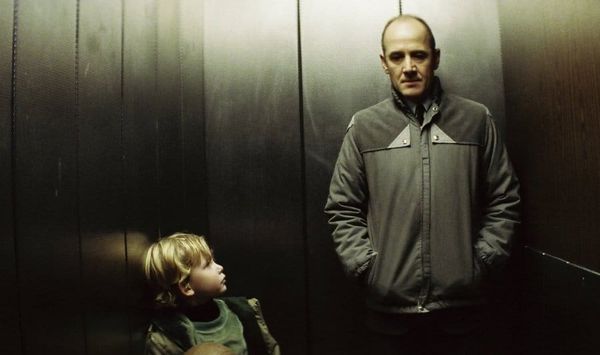Eye For Film >> Movies >> The Lives Of Others (2006) Film Review
The Lives Of Others
Reviewed by: Chris

Maybe you know the saying, "Dance as if no-one were watching, sing as if no-one were listening"? I wonder why we say that. Is there something magical about privacy? Something that lets the spirit free?
Our story starts before the fall of the Berlin Wall. The Stasi, East Germany's Secret Police, has refined its way of dealing with artists. No violence. Psychology. Persuasion. Surveillance. The lives of others are not their own. Most artists give up. Many commit suicide. Your best friend. Your lover. Georg Dreyman is lucky. He survives.

The Lives of Others spans seven years - from 1984 to 1991. The first hour sets the scene so we are completely immersed in Communist Germany. Then Dreyman and his partner confront the fact that their lives are being compromised. The emotional intensity of this is in gut-wrenching contrast to the bland story so far. Finally, as the Stasi surveillance kicks in, they wonder if they can survive - or even if they want to.
One of the film's strengths is that the characters are so believable. Dreyman is a sophisticated intellectual, a successful playwright. His partner, Christa-Maria, is an acclaimed actress. Then there's Stasi agent Gerd Wiesler, a heartfelt supporter of communism, who is assigned to spy on them. Wiesler has a crisis of conscience and decides not to prosecute Dreyman. The Lives Of Others has created debate and furore in Germany. Firstly, because the ex-Stasi now try to portray the regime as none too harmful. Secondly, because the facts show that, with the system of double-checks that were in place, no such character as Wiesler existed or could have existed. The film's director says it is about the ability of human beings to do the right thing, no matter how far they have gone down the wrong path. It seems like a good story (as long as we don't re-write history in the process).
As I came out of a packed multiplex auditorium, I marveled. People turning out in such numbers to see a subtitled movie. And so they should. But, its Oscar win (Best Foreign Language) apart, The Lives Of Others is particularly poignant for British audiences. A poll published at the end of 2006 indicated almost 80% of us agree that Britain has become a 'surveillance society'.
This is why The Lives Of Others strikes such a chord. Thousands of new offences, limitations on freedom of assembly, on privacy, freedom of movement, the right to silence, and freedom of speech. Privacy International ranks the UK ahead of the US, Europe and most developing countries, as a 'world worst offender' for surveillance, and as 'an endemic surveillance society' (in the same category as Russia and China). We are by far the most-watched nation on earth, with a CCTV camera for every 14 people. Apart from the corrosive effects of surveillance (notably, in our film, on artists), new technology (including DNA and tracking of non-suspects) raises nightmarish possibilities of abuse. When disaster hits Dreyman's life, it is because a high-up official is abusing the system. Dreyman and Christa-Maria's lives are shattered, and he becomes determined to help expose the disease in their society.
As I catch the bus home from the cinema (watched by more CCTV), I read a newspaper report of an Aberdeen University study finding tough government policies aimed at curbing Islamic radicalism are having the opposite effect. Since 9/11, Britain has eroded the principles it claims to be defending, and people fear (with some justification) that the Government's 'bottom-up accountability' is a blueprint for a 21st century version of a police state. A vicious circle?
The Stasi had many more times the secret police that Nazi Germany had - but under a more polite system. And modern technology does away with the need for so many human operatives. The Lives Of Others does not feature Gestapo tactics. This is the 1980s, and the Stasi are modern-looking officials, not hit-men. Most of them have been convinced that their work is for the public good.
Dreyman is criticised for minor offences - possessing Western newspapers. It gives them a polite excuse to keep tabs. One perhaps thinks of the UK DNA database (the world's largest) that samples those who have committed very minor offences - or no offence at all. The official reason for diversifying surveillance on Dreyman is "lack of suspicious acts."
Our fictitious 'good man' in this multifaceted masterwork (the man to whom Dreyman eventually dedicates a novel) is in some aspects played by Ulrich Muhe. In a strange irony, Muhe has examined his own Stasi files - from the days when he was an actor in East Germany. He found his former wife had informed on him through the six years of their marriage. For Muhe, the Brechtian self-awareness that is referenced (but never directly used) in the film gives it a meaning beyond mere entertainment. The movie's style is mainstream - as if 'no-one was watching'. We just identify with what is happening on screen. But then we think about our own lives. Whether it is "the grey men who ensure safety in our land" or the emotional ties; how far would you go to protect a loved one, or how far could someone go to mess with your head?
Watch and listen carefully: The Lives Of Others is a film that can cut deep.
Reviewed on: 14 Apr 2007


















